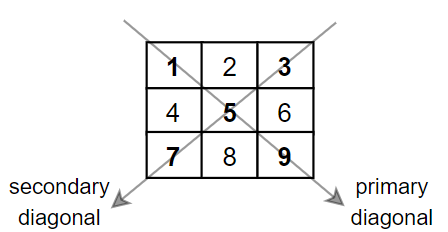1572 - Matrix Diagonal Sum (Easy)
Problem Link
https://leetcode.com/problems/matrix-diagonal-sum/
Problem Statement
Given a square matrix mat, return the sum of the matrix diagonals.
Only include the sum of all the elements on the primary diagonal and all the elements on the secondary diagonal that are not part of the primary diagonal.
Example 1:

Input: mat = [[1,2,3],
[4,5,6],
[7,8,9]]
Output: 25
Explanation: Diagonals sum: 1 + 5 + 9 + 3 + 7 = 25
Notice that element mat[1][1] = 5 is counted only once.
Example 2:
Input: mat = [[1,1,1,1],
[1,1,1,1],
[1,1,1,1],
[1,1,1,1]]
Output: 8
Example 3:
Input: mat = [[5]]
Output: 5
Constraints:
n == mat.length == mat[i].length1 <= n <= 1001 <= mat[i][j] <= 100
Approach 1: Iteration
We have to first iterate the primary diagonal first. In the primary diagonal, the row number equals to the column number, so it is pretty straightforward to get the numbers on the primary diagonal. On the secondary diagonal, the column number decreases as row number increases, and you should be able to obtain the relation col = len(mat) - row - 1. We also have to be mindful to avoid computing the element at mat[len(mat)//2][len(mat)//2] twice, so we add a conditional check to skip if it exists. Note that this does not always exist (if the dimension of the matrix is two even numbers)
def diagonalSum(self, mat: List[List[int]]) -> int:
#initialize result
result = 0
#add all values in primary diagonal
for row in range(len(mat)):
#col = row in primary diagonal
col = row
#add the value to result
result += mat[row][col]
#add all values in secondary diagonal
for row in range(len(mat)):
#col is the the opposite end of row in secondary diagonal
col = len(mat) - row - 1
#to avoid adding the center number twice, we skip if row == col
if(row == col):
continue
#add the value to result
result += mat[row][col]
#return result
return result